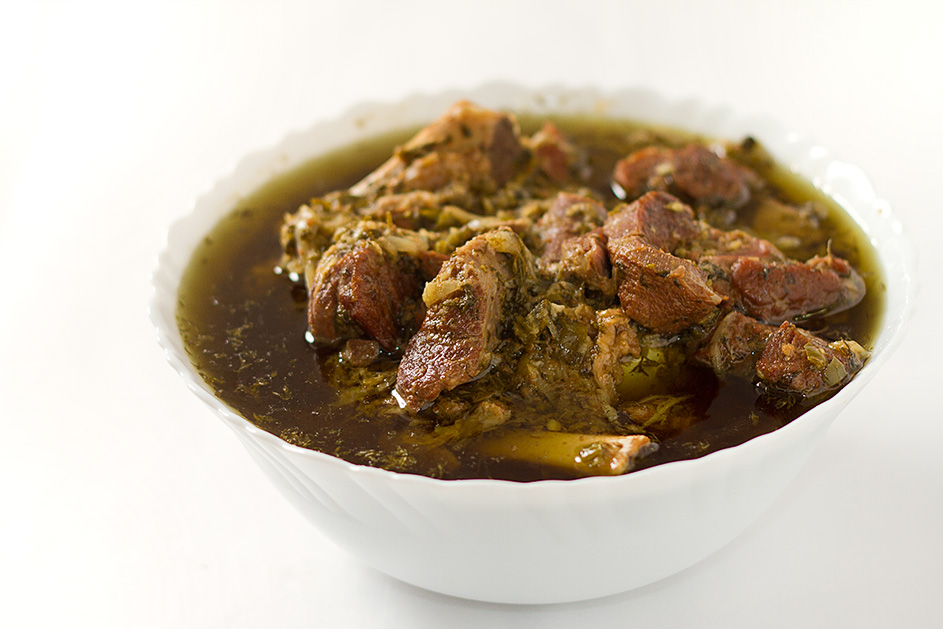Mutton Rezala
2015-03-27- Cuisine: Indian
- Course: Main Course
- Skill Level: Beginner
- Yield : 1000 gms
- Servings : 8-10
- Prep Time : 20m
- Cook Time : 40m
- Ready In : 60m
All along I thought that Rezala was a dish with white gravy, so when I came across a recipe which was dark green in colour my interest was piqued. This Mutton Rezala is one of the simplest and the tastiest mutton recipes that I have made and its dark green colour is because of the green herbs used. I found this recipe in the cookbook “The cooking delights of Maharajas” written by Shri Digvijay Singh, and he writes that this Mutton Rezala (Kalia Rezala) was made in the Nawabi kitchens of Bhopal and this recipe was given to him by one of the begums of Bhopal.
This version of Mutton Rezala is by no means for health freaks as it uses a large quantity of ghee and green chillies along with very few herbs and one single spice, but it is a treat for mutton lovers because it is so unique and flavorful.
Ingredients
- Mutton pieces from leg 600 gms
- Ghee 200 gms
- Green chillies cut lengthwise and seeds removed 150 gms
- Onions thinly sliced 250 gms
- Curd 250 gms
- Fresh coriander leaves chopped 120 gms
- Ginger paste 1.5 tsp
- Garlic paste 1 Tbsp
- Salt to taste
- Cumin seeds roasted and powdered 10 gms
Method
Step 1
Melt ghee in a pan (I used a pressure cooker) and add onion followed quickly by ginger, garlic, mutton, green chillies, coriander lives, curd, salt and cumin powder. Mix well, do not add water. Shut the lid of the pan (or the pressure cooker) just as the the ingredients heat up.
Step 2
If using a pan, seal the lid with dough and cook it for about 1.5 hours. If using a pressure cooker, reduce heat after one whistle and cook for 40-45 minutes.
Step 3
After the meat is cooked, (the pressure of the pressure cooker should drop on it's own). open the lid, stir a little carefully or else the meat pieces will break and serve with hot Nan or zeera rice, or both.
Step 4
Note: If you have an earthen pot, use it. The dish will taste better.
Mughal Influence on Bangladeshi Cuisine
Islam arrived in Bengal probably around the mid-thirteenth century, coming into force with the penetration of the Muslim rulers from the northwest. Dhaka (the present-day capital of Bangladesh), in particular, expanded greatly under Mughal rule. The partition of India in 1947 resulted in a large migration of people to and from present-day Bangladesh, resulting in a much stronger divide along religious lines. Bangladesh today shows a much greater Muslim influence than West Bengal.
The influence on the food was from the top down, and more gradual than in many other parts of India. This led to a unique cuisine where even commoners ate the dishes of the royal court, such as biryani, korma and bhuna. The influence was reinforced in the Raj era, when Kolkata became the place of refuge for many prominent exiled Nawabs, especially the family of Tipu Sultan from Mysore and Wajid Ali Shah, the ousted Nawab of Awadh. The exiles brought with them hundreds of cooks and masalchis (spice mixers), and as their royal patronage and wealth diminished, they became interspersed into the local population. These highly accomplished cooks came with the knowledge of a very wide range of spices (most notably saffron and mace), the extensive use of ghee as a method of cooking, and special ways of marinating meats.
In Bangladesh, this food has over time become the staple food of the populace. In West Bengal, however, this has remained, more than the other categories, the food of professional chefs; the best examples are still available at restaurants. Specialties include chap (ribs slow cooked on a tawa), rezala (meat in a thin yogurt and cardamom gravy) and the famous kathi roll (kebabs in a wrap). The local population absorbed some of the ingredients and techniques into their daily food, resulting in meat-based varieties of many traditional vegetarian dishes, but by and large the foods remained distinct.
Source: Wikipedia





